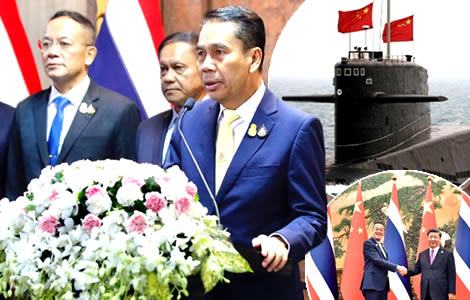Distinct possibility of a legal wrangle as the government seeks credit for the ฿7 billion already paid in respect of a breach of contract by the Chinese state-owned shipyard based in Shanghai in a deal that the Chinese government guaranteed
Prime Minister Srettha Thavisin appears to have held firm on his visit to Beijing this week as Thailand scotched the proposed purchase of an S26T Yuan class submarine for ฿13.5 billion and instead offered to purchase a frigate for ฿17 billion if the money already paid for the sub can be credited. The Thai proposal has not been agreed. Neither has the possibility of a legal case been ruled out, as nothing is yet finalised. On Friday, the Minister of Defence, Sutin Klangsaeng, gave a full briefing to reporters on the situation in the light of intense public concern over the purchase, especially in view of the failure of the Chinese state-owned contractor to complete the initial 2017 contract.

On Friday afternoon, Thai Minister of Defense, Mr Sutin Klangsaeng, sank plans by the Royal Thai Navy to agree to purchase an S26T Yuan class submarine from a Shanghai shipbuilding yard.
The Thai overture came following a compromise proposal from Chinese authorities last year. A Chinese-made CHD620 engine was put forward as a replacement for the German-made MTU396 diesel-powered engine agreed in the original 2017 contract.
Call on the submarine follows years of controversy
The decision on the submarine follows years of controversy and public criticism of the project, which at one time aspired to bring about the purchase of three S26T Yuan class submarines, the first of which has already been partially built and was due to be delivered in 2027 if the revised Chinese terms, proposed last year, had been accepted at the same time.
Observers of Thai-Chinese relations had speculated on the possible outcome of this week’s discussions between Prime Minister Srettha Thavisin and China’s President Xi Jinping.
This stance by the Thai government is more assertive and can be seen in the context of a more independent and global foreign policy.
Change of emphasis ahead of trip by PM Srettha Thavisin to Beijing to talk trade and submarines
Chinese nuclear-powered sub disaster, 55 dead in the Yellow Sea, a wakeup call for Thailand
Navy may accept Chinese engine in new ฿13.5 billion sub if it gets an older one thrown in for free
At 3 pm on Friday, on a visit to Royal Thai Navy Headquarters, the Minister of Defence, Mr Sutin, met with the Commander of the Navy, Admiral Adung Phan-iam, and senior high-ranking officers.
Ministry of Defence Sutin Klangsaeng on Friday gave a frank and robust briefing on the Navy’s new plan to replace the Chinese submarine with a frigate
The minister signed a guest book and spoke at length to reporters.
After winding up his meeting with the top brass at 5 pm, Mr Sutin quickly addressed the issue of the inability of the Chinese contractor to provide the German-made MTU396 engines associated with a Rolls Royce-owned company to the Royal Thai Navy.
On taking office in early September, Prime Minister Srettha Thavisin had promised to use his position to see if a compromise could be brokered between German authorities and the Chinese over supplying the engines required for the Thai submarine vessel under construction, but this was not possible.
The ban on the export of the highly prized German engines to China has come in the wake of heightened tensions between the West and the Communist Party in Beijing, which is in the process of rearming its military, particularly with the expansion of the People’s Liberation Army (PLA) Navy in connection with China’s expansive claims in the South China Sea and its ambitions related to Taiwan.
Submarine discussed at the highest level between Xi and Srettha on Thursday at the Belt and Roads Forum
It is understood that Prime Minister Srettha Thavisin discussed the issue on Thursday in high-level talks with President Xi Jinping of China and Premier Li Qiang, who has been in office since March this year.
The Thai PM was in Beijing to celebrate the 10th anniversary of the Belt and Road Initiative, a signature project of President Xi.
During the Belt and Road Forum for International Cooperation, Prime Minister Srettha made a keynote speech in which he touched on Thailand’s involvement in the project, which extends to 155 countries encompassing 75% of the world’s population, including Thailand.
However, the project has been scaled back in recent years and refocused as China’s economy has suffered setbacks.
At the same time, some countries participating have either rejected its terms, regretted involvement, such as Italy or found themselves in financial difficulty trying to repay large Chinese loans.
Twenty-two nations, including Argentina, Pakistan, Sri Lanka and Ukraine, are in this position.
Tough exchanges with Chinese negotiators on the submarine issue and the possibility of a legal wrangle over Thailand’s new position not yet been ruled out
During the two-day visit to China, Prime Minister Srettha met top officials in the Chinese administration and noted the rising tensions between China and the United States causing the impairment of trade, which has led to a world economic slowdown that has particularly impacted Thailand.
The Prime Minister used the occasion to invite the Chinese leader to visit Thailand.
On Thursday, at the Royal Thai Navy Headquarters, the Minister of Defense, Mr Sutin, referred to Chinese negotiators over the last few days who tried to get Thailand’s commitment to the submarine and to finish the contract according to last year’s revised terms put forward to the Royal Thai Navy who in turn recommended it to the government.
It is understood that at the end of the talks this week, China had accepted the principle of the new Thai position: it would proceed with a contract only to purchase a Chinese frigate.
Terms of the contract between the Royal Thai Navy and a Chinese state-owned firm in 2017 are not known, but it was seen as a state-backed agreement
Notwithstanding this, matters are far from resolved.
There is some speculation that some sort of legal tussle between the Chinese contractors and the Navy may ensue due to the matter.
The previous government, through then Deputy Prime Minister Prawit Wongsuwan, had constantly pointed out that the submarine deal was a state-to-state contract guaranteed by Beijing.
PM and Defence Minister suggests for the first time that the Chinese submarine contract may be scotched
The failure of the Shanghai-based China Shipbuilding and Offshore International Co (CSOC), a Chinese state-owned firm, to deliver the submarine as specified with the required engines is a clear breach of contract according to the specifications for the submarine in the 2017 agreement.
However, the Chinese may claim Force Majeure depending on the contract’s terms.
In the absence of an agreed resolution between the two governments, it needs to be clarified how the matter could be decided, which also depends on the nature of the agreement signed in 2017.
Decision is not a political one, insists Minister
Addressing reporters on Friday, the Minister made it clear that the decision that has been arrived at was not one based on politics or Pheu Thai’s policies before being elected to office.
The party had vigorously opposed the plan to purchase the submarines first mooted in 2015 by the National Council for Peace and Order (NCPO) or military junta.
Mr Sutin pointed out that every effort was made to facilitate the Navy’s plan to protect the kingdom.
But the Navy was also asked to understand that any money spent on defence must be considered worthwhile and executives, both at a political and military level, are ultimately answerable to society for decisions made.
In light of this, the Defence Minister said that before the Prime Minister visited Beijing, the Navy had suggested several solutions.
Navy outlined options ahead of the Beijing visit. The government decided on a new frigate for ฿17 billion but seeks credit for the failed sub contract
Afterwards, when it became clear that the Prime Minister could not negotiate the delivery of the German submarine engines, the Navy submitted two alternative proposals.
The first was to purchase a frigate with three firing systems for air, surface and underwater warfare.
The Navy informed the government that although this solution would cost ฿17 million, it pointed to a ฿1 billion saving on the original proposal.
Navy officers informed the government that the frigate proposal would not involve building a docking structure for new submarines, and this would save ฿1 billion.
A contract had yet to be signed for this facility, which would have been required by 2027 and is budgeted for.
The Naval service, alternatively, proposed the purchase of an advanced patrol boat with long-range capability, which the Army could also use as something conducive to defence priorities at sea.
Some embarrassment both for Thai and Chinese authorities over the matter, the minister conceded on Friday as he did not rule out a possible legal dispute
Mr Sutin said that the proposal to purchase the frigate had been made to Chinese authorities, but no decision had yet been reached, and no conclusive response had been received from China.
He admitted that the situation has led to embarrassment for Thai authorities amid fears that their Chinese counterparts may have lost face.
The minister said that the situation for everyone was difficult, but the Thai government hoped its proposed solution could work.
Minister Sutin, however, made it clear that any agreement for a Chinese-made frigate would have to include finalising all legal issues concerning the submarine, and this may take some time so that the details can be worked out.
Minister also insisted sub plan only suspended
He stressed that the plan for a Chinese-made frigate was, at this stage, only a proposal from the Thai government based on recommendations from the Royal Thai Navy.
He also clarified that the plan to purchase a Chinese submarine had not been cancelled but suspended.
The Minister insisted that the proposal made by the Thai delegation in Beijing represented a further change of conditions on the contract for a submarine now to be replaced by a naval frigate.
Thailand is proposing that the money already paid for the submarine be credited against the proposal to purchase a frigate.
This amounts to approximately ฿7 billion, meaning the government would have to fund a further ฿10 billion as opposed to ฿7.5 million to complete the submarine with a Chinese engine and build a docking facility.
Join the Thai News forum, follow Thai Examiner on Facebook here
Receive all our stories as they come out on Telegram here
Follow Thai Examiner here
Further reading:
Chinese nuclear-powered sub disaster, 55 dead in the Yellow Sea, a wakeup call for Thailand
Navy may accept Chinese engine in new ฿13.5 billion sub if it gets an older one thrown in for free
Sub call due soon but closer ties between Chinese and Thai navies signalled by top-level visit
War with China is a rising spectre that must be confronted as US General predicts conflict by 2025
Heat turned up over the Sukhothai naval tragedy with 19 thought to have perished and 10 missing
Bad news from Beijing with Xi’s rise, the prospect of war and a divided world have greatly grown
Abe’s legacy will be his efforts to awaken Japan and build a defensive alliance against China
Former Pheu Thai finance minister expresses unease about US regional moves to counter China’s rise
Thailand and Japan announce defence pact on visit by Japanese PM to Bangkok ahead of US summit
US ASEAN summit as ‘dangerous directions’ now emerging in Asia as China’s regional power rises
US sanctions on Russia part of a ‘profound’ geopolitical shift to Asia as many US firms leave China
Thai tourism emphasises its neutrality in the Ukraine war, calls for a review of payment systems


















